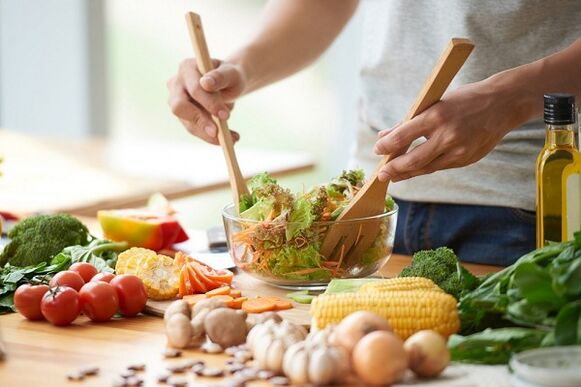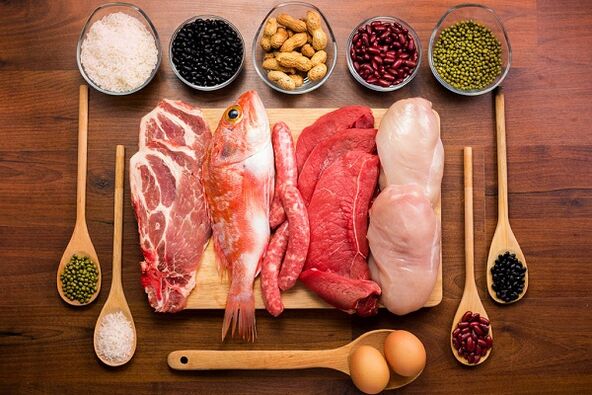Proper nutrition for various diseases is an important component in a speedy recovery. Diet for prostatitis and prostate adenoma improves the condition of the body, helps fight a number of unpleasant symptoms in men. Mistakes in diet, on the other hand, can exacerbate unpleasant symptoms and increase the discomfort caused by prostate disease.
Nutritional characteristics for prostatitis
Main Effects of Eating Properly in Prostate Inflammation:
- Prevents irritation of the pelvic organs, which can exacerbate inflammation.
- Strengthens the function of the immune system.
- Normalization of the gastrointestinal tract.
- Decreased desire to urinate, especially at night.
- Prevention of hardening of the prostate by restoring blood flow and providing nutrients to the organs.

Therapeutic diets involve:
- Dietary enrichment with healthy products.
- Set a drinking regime (at least 2-2. 5 liters of filtered water per day).
- The combination of eating "healthy" foods with physical activity (e. g. , physical education).
- Compilation of separate menus for the "exacerbation" and "forgiveness" phases.
- Complete rejection of bad habits.
Useful products
Proper nutrition for prostatitis in men consists of food intake that helps speed up its healing. Detailed recommendations are given by the physician.
The following should be added to the diet:
- Beans of all kinds.
- Various dried fruits.
- Lean meat.
- Parsley and other fresh herbs.
- Red fish.
- Vegetables.
- Vegetable fats.
- Non-acidic fruits.
- Gray bread.
- Buckwheat / oatmeal.
- Roasted milk, kefir and cottage cheese.
- Fruit compote.
- Honey.
- Fresh juices (especially, asparagus).
- Parsnip.
When creating a daily diet menu, it is necessary to pay attention to the amount of fiber consumed. Essential for normal bowel movements (excretion of feces from the digestive tract by the body). You should also eat foods fortified with zinc. Trace elements increase resistance to infection and improve (as well as the quantity) quality of semen.
In the event of a stable forgiveness, the following are allowed:
- Mushrooms.
- Spices.
- Some fried foods.
- Dry wine (1-2 times a month 100 ml).
Food Contraindications
When diagnosed with prostatitis, the following are prohibited for men:
- "Fatty" foods - increase cholesterol levels, encourage the formation of plaque on the walls of blood vessels. Regular “fatty” diets cause blood circulation to be disrupted, complicating the course of the disease.
- Alcohol (even beer) - has a negative effect on blood flow and men's health in general. This leads to the appearance of congestion in the small pelvis, reduces immunity, interferes with hormone production and prostate secretion, and interferes with erectile function.
- Strong coffee - has a negative effect on the vascular system, increases pressure on the prostate gland, induces the spread of infection (with a bacterial or viral inflammatory etiology) throughout the body.
The following products are also contraindicated:
- Fast food.
- Sup so.
- By -products.
- Mushrooms.
- Hot peppers, garlic and onions.
- Pickles.
- Spicy food.
- Smoking products.
- Fatty pigs and goats.
- Burner.
- Sour fruit.
- Foods that contain chemical additives.
- Carbonated drinks.
- Spices.
- Candy.
Diet for prostatitis in men: a menu for a week
Dietary changes depend on the degree of prostatitis. The diet for chronic prostatitis can be even more varied. Examples of weekly menus for men in remission are shown in the table.
| Breakfast | Lunch | > / > | |
| Monday | Cabbage and carrot salad; Oatmeal porridge; Fruit juice. |
Vegetable soup; Boiled beef with vegetable stew; Some fruit. |
Curd puffed; Fresh apple juice. |
| Tuesday | Cucumber and green salad; Millet porridge; Cherry compote. |
Shrimp and vegetable soup; Steamed pieces with mashed potatoes; Tea with honey. |
Fritter; Berry salad flavored with sour cream. |
| Wednesday | Buckwheat; Cucumbers and tomatoes; Morse. |
Borscht in vegetable soup; Boiled breasts; Garlic salad; Green tea. |
Carrot cake; Spoon sour cream; Kissel from fruits. |
| Thursday | Vinaigrette; Pumpkin seeds and dried apricot cupcakes; Boil the herbs. |
Fresh cabbage soup; Boiled rabbit with vegetable garnish; Sweet oranges. |
Steamed fish; Celery Boil; Apple compote. |
| Friday | Milk soup; Dry bread with cheese; Mint tea. |
Chicken soup; Boil beef with baked potatoes; Tomato. |
Pancakes with berries; 2 tablespoons low -fat cottage cheese. |
| Saturday | Corn porridge with dried apricots; Boiled eggs; Fresh orange juice. |
Vegetable turkey soup; Steamed meatballs; Dried fruit compote. |
Potato casserole; Lettuce leaves with olive oil. |
| Sunday | Baked potatoes; Salad with peeled pumpkin seeds; Boil the herbs. |
Cheese soup; Steamed fish with buckwheat; Green or white tea. |
Pieces of vegetables; Jus beri. |
Against the background of joy, the diet should be light and gentle. Nutritionists advise the following options:
- Breakfast. Buckwheat porridge "smear", fruit jelly;
- Lunch. Cabbage soup, boiled fish, beet salad, tea without added sugar;
- Dinner. Steamed chicken meatballs with boiled vegetables and compote;
- For the night. A handful of homemade yogurt.
The following menu will also work:
- Breakfast. Oatmeal with a little honey, cherry jelly;
- Lunch. Melted tomato soup, light vegetable salad, a slice of whole wheat bread with low -fat cheese, green tea;
- Dinner. Boiled zucchini with egg, a piece of boiled fish, fresh;
- Before bed. Strawberry juice.
The following diet is suitable for antibiotic therapy:
- Morning. Curd casserole with berries, herbal tea;
- Hari. Carrot salad, chicken soup, boiled rabbit with vegetables;
- Evening. Grilled vegetables, bananas and apples;
- For the night. A glass of yogurt.
How to eat properly for BPH?
Benign prostatic hyperplasia (BPH) is expressed in the proliferation of organ tissue. After confirming the diagnosis, the doctor, in addition to drug therapy, prescribes a special diet. For BPH, the diet is based on several principles:
- Lack of hunger combined with weight correction;
- In case of obesity, food is chosen in such a way as to ensure weight loss;
- A varied menu, dishes containing the necessary micro -elements and vitamins;
- Divide daily food intake into 4-5 servings;
- Avoid food before bed.
The main focus is on products that help reduce benign tumors. Any food that increases the load on the bladder and causes (even indirectly) the inflammatory process is not included.

Dietary disorders in BPH are common in men:
- Constipation or diarrhea.
- Irritation of the bladder.
- Increased risk of secretory and blood stagnation in the prostate.
Sometimes men with a diagnosed prostate adenoma switch to a sports diet, considering it the most balanced. It is important to understand that it was developed for healthy people (and that, in addition to staple foods) and is not intended for use in the presence of pathological processes in the body.
Nutritional Guidelines for BPH:
- Food should be eaten at the same time.
- The feeling of overeating cannot be tolerated.
- Diet is calculated for each man individually.
- The main focus is on foods that contain fiber and zinc.
- Elimination of foods that negatively affect the immune system.
- Diets vary depending on whether you are undergoing medication or surgery.
Foods useful for BPH are included in the diet:
- Vegetable fats.
- Meat diet.
- Baked or raw vegetables and fruits. It is very important to add cucumbers, pears, kiwis, potatoes, watermelons, bananas, and dates to the diet.
- Fermented milk products.
- Pomegranate, carrots, beets, cranberry juice and tomatoes.
- Shellfish, fish, seaweed.
Like prostatitis, drinking is important. You need to drink about 2. 5 liters of water per day.
Experts advise to reject:
- Fast food.
- Processed and smoked cheese.
- Milk.
- Save juices and sugary drinks.
- Lada chili.
- Garlic.
- Candy.
What do men's reviews say?
On the Internet, you can get comments from men talking about their own experiences with prostatitis and BPH. Along with information on medications, patients also shared dietary results in their reviews.
"I've been suffering from prostatitis for over 5 years. So far, I haven't tried anything. And I went to the doctor, and engaged in self-treatment, it doesn't make sense. For myself, I state that while maintaining a lifestylethat’s right (I’m talking about nutrition now), relapses happen more rarely, and it’s not so “bright. ” The most important thing is to exclude alcohol, and not smoke if possible, and, as always, discard fried, salty and spicy foods. "
"Six months ago, I started having severe urinary problems. I went to the doctor, he said I had prostatitis. First of all, he warned me that treatment and recovery depended on how I ate and how active I was. "There is no trace of prostate inflammation. I am convinced that diet has contributed to the effectiveness of the treatment".
"Prostate adenoma creeps in unnoticed. The doctor says that surgery is not recommended at my age (besides, I have heart problems). He prescribes medications, advises him to walk more in the fresh air and adjusts his diet, writes down whatyou can eat and what you can't eat. He strictly forbids drinking alcohol. I feel pretty good, erections also appear. The mood improves, I want to live with a new spirit ".
























